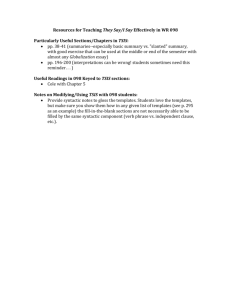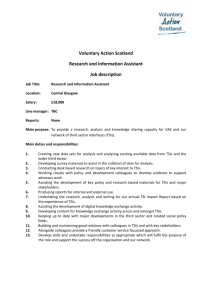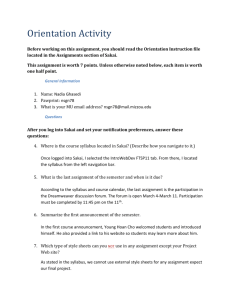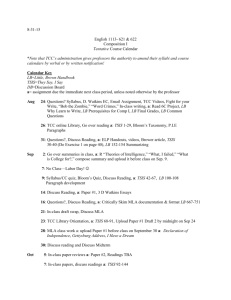195271Syl
advertisement
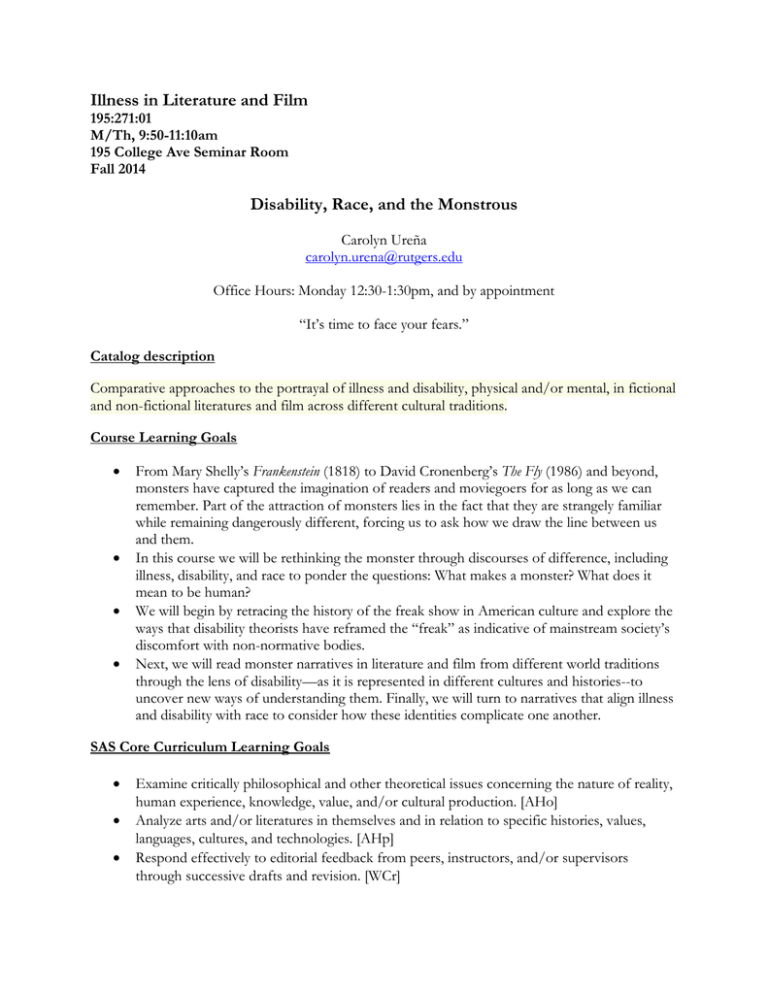
Illness in Literature and Film 195:271:01 M/Th, 9:50-11:10am 195 College Ave Seminar Room Fall 2014 Disability, Race, and the Monstrous Carolyn Ureña carolyn.urena@rutgers.edu Office Hours: Monday 12:30-1:30pm, and by appointment “It’s time to face your fears.” Catalog description Comparative approaches to the portrayal of illness and disability, physical and/or mental, in fictional and non-fictional literatures and film across different cultural traditions. Course Learning Goals From Mary Shelly’s Frankenstein (1818) to David Cronenberg’s The Fly (1986) and beyond, monsters have captured the imagination of readers and moviegoers for as long as we can remember. Part of the attraction of monsters lies in the fact that they are strangely familiar while remaining dangerously different, forcing us to ask how we draw the line between us and them. In this course we will be rethinking the monster through discourses of difference, including illness, disability, and race to ponder the questions: What makes a monster? What does it mean to be human? We will begin by retracing the history of the freak show in American culture and explore the ways that disability theorists have reframed the “freak” as indicative of mainstream society’s discomfort with non-normative bodies. Next, we will read monster narratives in literature and film from different world traditions through the lens of disability—as it is represented in different cultures and histories--to uncover new ways of understanding them. Finally, we will turn to narratives that align illness and disability with race to consider how these identities complicate one another. SAS Core Curriculum Learning Goals Examine critically philosophical and other theoretical issues concerning the nature of reality, human experience, knowledge, value, and/or cultural production. [AHo] Analyze arts and/or literatures in themselves and in relation to specific histories, values, languages, cultures, and technologies. [AHp] Respond effectively to editorial feedback from peers, instructors, and/or supervisors through successive drafts and revision. [WCr] Ureña 2 Communicate effectively in modes appropriate to a discipline or area of inquiry. [WCd-t] Comparative Literature Program Learning Goals Students who major in Comparative Literature will demonstrate familiarity with a variety of world literatures as well as methods of studying literature and culture across national and linguistic boundaries and evaluate the nature, function and value of literature from a global perspective. They will demonstrate critical reasoning and research skills; design and conduct research in an individual field of concentration (such as literary or critical theory, women's literature, postcolonial studies, literature and film, etc); analyze a specific body of research and write a clear and well developed paper or project about a topic related to more than one literary and cultural tradition. They will demonstrate competency in one foreign language and at least a basic knowledge of the literature written in that language. Assignments & Assessment Participation Close Reading Blog Reflections (5) Oral Presentation Group Project Peer Editing Mid-Semester Paper (4-5 pages) Final Paper (6-8 pages) 10% 20% 20% 10% 15% 25% Required Texts Ana Castillo, Peel My Love Like an Onion Gabriel Garcia-Marquez, Of Love and Other Demons Franz Kafka, The Metamorphosis Toni Morison, Beloved Mary Shelley, Frankenstein Bram Stoker, Dracula Franz Kafka, The Metamorphosis David Cronenberg, The Fly Tod Browning, Freaks Graff, Gerald, and Cathy Birkenstein. They Say/I Say: The Moves that Matter in Academic Writing. New York: Norton, 2006. [ISBN: 978-0-393-93361-1] Additional secondary sources on Disability Studies will be posted on Sakai by Rachel Adams, Susan Antebi, Suzanne Bost, Ralph Ellison, Frantz Fanon, Rosemarie Garland-Thomson, and Harriet McBryde Johnson. Films will be available for viewing at the Rutgers Media Center on Douglass Course Calendar I. Eye of the Beholder: Laying the Groundwork Ureña 3 Week 1 Week 2 Rosemarie Garland-Thomson, selections from Extraordinary Bodies and Staring (Sakai) Episode of the Twilight Zone: “Eye of the Beholder” “Introduction: Entering the Conversation” (TSIS 1-14) “‘They Say’: Starting with What Others are Saying” (TSIS 19-28) Harriet McBryde Johnson, selections from Too Late to Die Young (Sakai) “‘So What? Who Cares?’: Saying Why It Matters” (TSIS 92-100); “‘But Don’t Get Me Wrong’: The Art of Metacommentary” (TSIS 129-138) Freaks (Browning) selections from Dreger, One of Us (Sakai) “‘As A Result’: Connecting the Parts” (TSIS 105-120) Week 3 Ana Castillo, Peel My Love Like an Onion selections from Bost, Encarnacion (Sakai) “‘Her Point Is’: The Art of Summarizing” (TSIS 30-41) Susan Antebi, selections from Carnal Inscriptions; Coney Island Narratives; Possible Invited Guest: Susan Antebi, University of Toronto “‘As He Himself Puts It’: The Art of Quoting” (TSIS 42-51), “‘Yes/No/Okay, But’: Three Ways to Respond” (TSIS 55-67) “‘Skeptics May Object’: Planting a Naysayer in Your Text” (TSIS 78-91) Week 4 Draft Workshop: Peer-review or an original draft in groups of three students each group. Oral Presentations. Week 5 Turn in to the instructor original draft with peer-reviewed markings, and revised draft produced after the workshop. Oral Presentations. II. Week 6 Dis-figured: Literary and Cinematic Monsters Essay #1 returned to the students for further editing. Shelley, Frankenstein; selections from Monster Theory Frankenstein Week 7 Ureña 4 Turn in final version of Essay #1. Kafka, The Metamorphosis The Fly; selected critical pieces (Sakai) Optional: The Elephant Man Week 8 Stoker, Dracula Dracula Week 9 Dracula Dracula III. Week 10 Spooks: Invisible Others Ellison, Prologue to Invisible Man (Sakai) Fanon, Chapter V of Black Skin, White Masks, "The Lived Experience of the Black Man" (Sakai) Week 11 García-Márquez, Of Love and Other Demons Of Love and Other Demons Week 12 Of Love and Other Demons Morrison, Beloved selections from Adams, Sideshow U.S.A: Freaks and the American Cultural Imagination (Sakai) Week 13 Beloved Beloved Week 14 DRAFT WORKSHOP, Turn in to the instructor original draft of Essay #2 with peer-reviewed markings (previously done online through sakai), and the revised draft produced after the online workshop. Ureña 5 DRAFT WORKSHOP, Essay #2 returned to the students for further editing. Dec 10 Turn in final version Essay #2.

